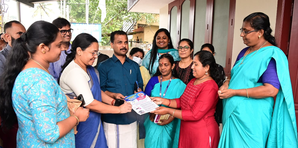Kerala campaign against antibiotics’ indiscriminate usage sees use dip around 30 pc: Minister
Thiruvananthapuram, Nov 21: Kerala Health Minister Veena George on Wednesday said the state-wide campaign that her department has launched against the indiscriminate use of antibiotics has seen a drop of around 30 per cent in their usage since the initiative began.
“With the drop in antibiotics use by around 30 per cent, it means people were having it before without actually having any reason to have it. This dip took place due to our campaign,” George said at a state-level campaign inauguration meeting held at a state-run school here. “Our aim is to see that all hospitals in the state are turned into antibiotic-smart hospitals. There should be no sales of antibiotics done through medical shops without a prescription from doctors,” she added. The Minister later joined health workers and took part in a door-to-door campaign near the school.
This campaign is to confront antimicrobial resistance (AMR) which is one of the top global public health and development threats as the misuse and overuse of antimicrobials in humans, animals, and plants are the main drivers in the development of drug-resistant pathogens. Another step that has been initiated is that antibiotics will have to be given in a blue cover and a doctor’s prescription will be compulsory for people when they buy it from medical shops. This campaign is in various stages in the 14 districts of the state and the targeted plan is to reach each and every home in the state. The campaign is also geared to cover areas where migrant workers are staying and the awareness class is being conducted in their mother tongues also. The awareness programme points out that no one should take antibiotics without a doctor prescribing it and the entire course prescribed by the doctor has to be completed.
People are also told that antibiotics should not be shared between people and utmost care has to be taken while disposing of old antibiotics. The Kerala government has taken up this programme very seriously as international studies have shown that AMR affects countries in all regions and at all income levels and the worst affected are the low and middle-income countries. Studies have also revealed that bacterial AMR was directly responsible for 1.27 million global deaths in 2019 and contributed to 4.95 million deaths.



